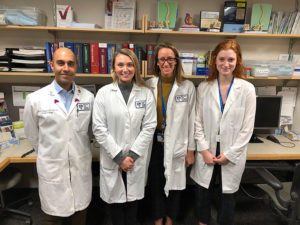
Through its comprehensive clinical services and research efforts, the Center for Adrenal Disorders at Brigham and Women’s Hospital is playing a key role in advancing adrenal care. As such, it continues the institution’s long tradition of excellence in the field.
“The Brigham has always been one of the world’s leaders in adrenal care,” said Anand Vaidya, MD, MMSc, director of the center. He added that George W. Thorn, MD, chief of medicine at the then Peter Bent Brigham Hospital from 1942 to 1972, is considered one of the pioneers in treating Addison’s disease and adrenal disorders.
Multidisciplinary Clinicians Who Specialize in Adrenal Care
Formed in 2011, the Center for Adrenal Disorders fosters close collaborations between adrenal specialists at the Brigham, the Dana-Farber Cancer Institute, Boston Children’s Hospital and Harvard Medical School to optimize multidisciplinary patient care.
Adrenal disorders can range from mild hormonal imbalances to severe hormonal dysfunctions, genetic conditions and cancers. In order to deliver exceptional care for such a wide variety of conditions, the center brings together a team of adult and pediatric medical endocrinologists along with adrenal surgeons, oncologists, geneticists, radiologists and pathologists.
“In each of those disciplines, we work with clinicians who specialize in adrenal care,” Dr. Vaidya said. “For example, we work closely with Dr. Matthew Nehs, an endocrine surgeon who specializes in adrenal surgeries, and Dr. Justine Barletta, a pathologist who specializes in adrenal disorders. I think that’s what makes our center special. We have multiple collaborative disciplines working together and dedicated to providing expert adrenal care.”
Dr. Vaidya’s team also has expertise in adrenal diseases that are rare and/or difficult to treat. For instance, the center has extensive experience diagnosing and treating hundreds of patients with pheochromocytoma (a tumor that arises from the adrenal glands), paraganglioma (a tumor that arises from the peripheral nervous system) and adrenocortical carcinoma.
Research Closely Tied to Clinical Efforts
Most of the research supporting the Center for Adrenal Disorders’ clinical efforts takes place in Dr. Vaidya’s laboratory, which focuses on the diagnosis, pathogenesis and treatment of human adrenal disorders and tumors. The laboratory aims to better understand primary aldosteronism and the genetics of pheochromocytoma and paraganglioma. Other goals are to improve the treatment for adrenocortical carcinoma and the quality of life for patients with Addison’s disease and adrenal insufficiency.
“We want to have a research program that focuses on improving clinical care for each major adrenal disorder,” Dr. Vaidya said. “Each year, our clinical and research programs have grown. We are proud to serve the growing number of patients with adrenal disorders and excited to expand our research mission.”